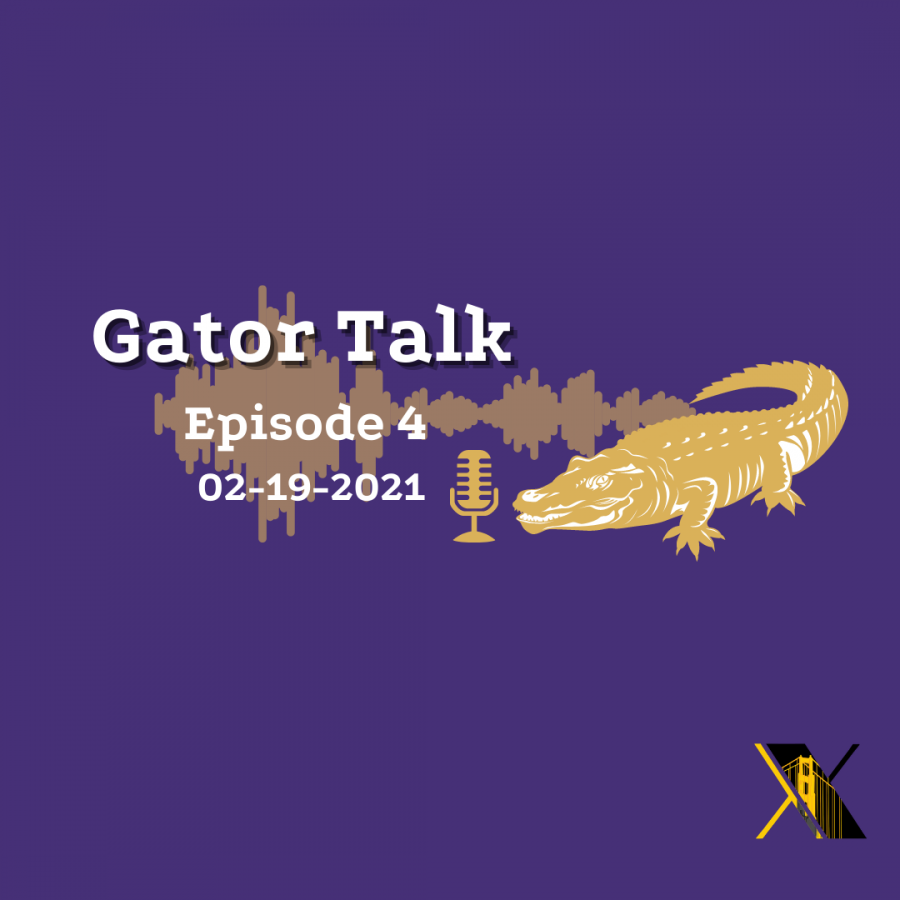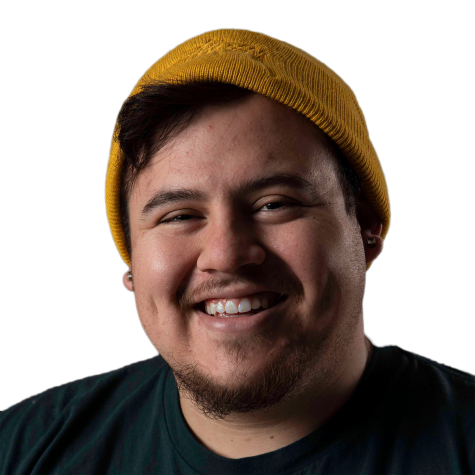Welcome to Gator Talk, a collaborative CalState podcast that brings city and statewide perspectives to SF State news.
In Gator Talk’s fourth episode, host Sebastian Mino-Bucheli shares the main story spot with Golden Gate Xpress city reporters Elizabeth Freeman and Dan DeJesus. Freeman conducted interviews with the chief curator of the African American Museum and Library at Oakland, Bamidele Demerson, and the curator from the AAMLO Digital Underground, Donielle Woods. DeJesus spoke with Professor Justin D. Gifford, an English professor at University of Nevada-Reno and author who will soon preview his book Revolution or Death: The Life of Eldridge Cleaver, at the African American Museum & Library at Oakland.
TRANSCRIPT:
Intro
*Salsa song fades in*
Mino-Bucheli: This is Sebastian Mino-Bucheli, I’m your multimedia editor and your host for Gator Talk, a Golden Gate Xpress podcast that brings news to Sf State students.
For more information/coverage, check out goldengatexpress.org OR @GatorTalkPod on all social media platforms.
Preview of the show
Mino-Bucheli: Here’s a quick preview of the show.
I’ll be updating the audience with a quick news brief with news that happened this week that matters to SF State students.
Reporters Dan Micheal DeJesus and Elizabeth Freeman will help preview the main story!
*Salsa song fades out*
News brief
Mino-Bucheli: Golden Gate Xpress Magazine Issue 1 releases today (Friday), and the theme is fashion.
Shamann Walton tweeted that there is a vaccine site Bayview Hunters Point, it’s full functionally.
So, I’m going to pass the microphone on to Elizabeth Freeman.
Main Story
Freeman: Hello, this is Elizabeth Freeman, city reporter from the Golden Gate Xpress. I’m going to set the scene up.
Black history month was started as a way to celebrate the historic achievements of Black people and culture. As of late, at a Utah public charter school, there’s been pushback in teaching Black History month in their curriculum by allowing their students to not participate in this month’s instruction.
However, in Oakland, the African American Museum and Library serves as a center for events and for knowledge, that highlights the art, history and culture of African Americans.
In 1994, the City of Oakland and the Northern California Center for Afro-American History & Life merged to create the African American Museum & Library at Oakland . In February 2002, the AAMLO officially opened at 659 14th Street.
AAMLO has a unique non-circulating reference library, meaning all the works stay in-house, available for anyone to use. Its collection consists of approximately 12,000 volumes of African American biographies and authors. AAMLO also has a collection of children’s books and about 400 videos and DVDs.
With me here is Bamidele Demerson, chief curator at the museum and library, talking about how they work with other organizations in the community.
Bamidele Demerson: “It certainly supplements what we were doing here because we cannot possibly do all the programming that our community needs, what our community deserves, or perhaps what our community wishes to see occur. But if other organizations can do that, that’s great. And if we can provide a forum or a space, even a virtual space for that to occur, then we are pleased to do so because our objective is to serve the community.
“Sometimes, people will sometimes call us and let us know that they have a new book that they have just written, or recently written. And sometimes we find out about books and we invite authors to come in, or in this case to appear with us online. And we do so by the wonders of zoom. So we can create virtual spaces. And we allow, I mean we send out a notification that we’re going to have a discussion of this new book that’s out and people will tune in.”
Freeman: Demerson addresses how the virtual changes AAMLO has seen due to the ongoing pandemic will impact how it operates in the future.
Demerson: “So the good thing about the virtual programming is that we are able to reach people across the world who may not be able to come here. So I’m sure that as we move forward into the future, even when we return back to our regular selves, that there will be some effort to continue with the virtual programming, because it certainly is advantageous.”
Freeman: I also have here today Donielle Woods, the curator of the AAMLO Digital Underground, a collection of titles from the museum and library you can read on the go, and a recent project she started as a way to serve patrons after COVID-19 closures.
Donielle Woods: “So I was like, what would be a good way for people to still access our collection or what the collection represents? So that way, we can still be, you know, helpful to be seen as useful to the public. And so that’s when the idea hit me like, oh, what if we can have like a dedicated banner that reflects, you know, AAMLO’s collection? On OPL, the, you know, overdrive page. And so that was the beginning of me developing or curating ammo digital underground.
“It’s something that I hope to continue to grow. And that we’ll be here, of course, after the closure, because even when, you know, we do return to full service, you know, our collection in the stands right now is still not circulating. And so people still want to be able to have access to these type of materials. So they can have it where they can check them out. They can download them, they can listen to them. And we’re able to provide that type of access. I hope that it’s something that people continue to use, and that stays around for a while.”
Freeman: She also let me in on a fun behind-the-scenes fact about the collection.
Woods: “One of the reasons I named it Digital Underground was because I knew that OPL was not going to let me get away with like ‘Hella Lit’, which is what I wanted to call it in the first place, but it’s also a nod to Oakland’s hip hop community. There was a group called Digital Underground and I wanted to make sure that the collection was really reflective of Oakland’s history and culture so I wanted to make sure that connection or that tie was still there. So I thought of a digital collection of books, especially focusing on non-fiction African American history and culture tied to a group that is from Oakland.”
Freeman: This was Elizabeth Freeman.
And with that, I’m signing off.
Mino-Bucheli: We’re gonna take a quick break.
Break
Mino-Bucheli: Support the Golden Gate Xpress’ work by signing up for our online newsletter, following us on Instagram or Twitter @ GGXnews and visiting the website: https://goldengatexpress.org
Interested in advertising with GGX? Check out our advertising page on goldengatexpress.org/advertising.
Matthew Faludi, campus news reporter premiered his video: SF State Studio Art Majors Weigh in on Remote Learning. Check it out at the multimedia section of our website.
https://goldengatexpress.org/96383/latest/multimedia/sf-state-studio-art-majors-weigh-in-on-remote-learning/
*break ends*
Dan DeJesus: Hi, my name is Dan DeJesus, city reporter with Golden Gate Express, and I am here to talk with author Justin D. Gifford, an English professor at the University of Nevada-Reno about his new book, Revolution or Death: The Life of Eldridge Cleaver.
DeJesus: The book details the life of former Black Panther Party leader Eldrige Cleaver, from his time with the Panthers all the way to his later life as a conservative Republican. The African American Museum and Library of Oakland and Gifford are hosting an online event on the 20th about the book.
I got Gifford to talk with us on his book, but first I asked him on both his work as an author as well as a professor at the University of Nevada-Reno.
Professor Justin D. Gifford: “So, I’m a professor of African-American literature at the University of Nevada in Reno, and my work focuses specifically on 20th century African-American literature. But my subspecialty is African-American archives. And I look particularly at black radicalism and how that intersects with black popular literature.”
DeJesus: I then asked Gifford how he was able to get in contact with the museum for help with the book as well as setting up the online event.
Prof. Gifford: “Yeah, so I really lucked out because I was looking around for different sources for the book. And they had copies of the Black Panther newspaper, which was the main economic and cultural engine of the Black Panther Party back in the 1960s and 1970s. And these are really difficult to come by. But they had a pretty complete collection of these, so they were willing to let me take a look at those. So I just I called them up and said, ‘Hey, can I come down and take a look?’
“And not only were they willing to let me come and take a look at these different newspapers, but they actually made copies of different speeches and things for me because I was interested in speeches that Eldridge Cleaver wrote and printed in the newspaper. And so I came down and they printed those out for me, and let me look at those.”
DeJesus: Gifford gave me a brief overview on just who Eldridge Cleaver was and why Gifford decided to cover him for his book.
Prof. Gifford: “I think one of the things that’s interesting about Cleaver is that he’s really the most revolutionary figure of the Black Panther Party. I mean, he’s the one that wanted to build an underground section of the party. A lot of the party became interested later in the reform program. So like the free breakfast program and other kinds of reform policies in the community, Eldridge Cleaver was a person who was committed to actual radical revolutionary politics. He stayed pretty uncompromising in this.
“And so I thought he was a really interesting figure for that, for the fact that he didn’t want to compromise his beliefs or his ideals. He stayed pretty close to the beliefs of someone like France Fanon or Malcolm X. And so I was interested in him for that reason. And then the other reason I became interested in him is that the more I started to dig into his archives, particularly the archives that his wife had in her attic, just kept away.”
DeJesus: I also asked Gifford on the challenges he faced in getting research for the book such as whether it was straightforward or difficult in obtaining the declassified information. Also, I wanted to know if he got into contact with any of Cleaver’s family members for help as well.
Prof. Gifford: “Another part of the project that was complicated was I wanted to talk to Cleaver’s son, Masayo, and he lived in Saudi Arabia at the time. And as you might know, Americans aren’t allowed to go to Saudi Arabia without a special visa.
“And I wasn’t allowed to go into the country because of that. So he met me in Morocco and we spent a week in Morocco together with me, interviewing him about his father and getting the inside information about his father’s life and what he was like outside of the public spotlight. And that really gave me a lot of insider information and the type of man he was outside of his life as a panther, outside of his life as a public speaker. And that was incredibly informative.”
DeJesus: As for future plans, Gifford is looking to start his next project on Octavia Butler, an African American science fiction writer who became the first science fiction writer to win the MacArthur Fellowship Award in 1995.
Prof. Gifford: “So Octavia Butler is a black female science fiction writer. She’s actually one of the first and I’m really interested in her work. She started writing in the 70s and has recently she died a couple of years ago. But she’s recently got a lot of attention for being one of the first African-American science fiction writers. And so I’m interested in looking at writing a book about her.
“So I’m kind of still figuring that out. But that looks like where the next project will probably go.”
DeJesus: This was Dan DeJesus.
And with that, I’m signing off.
End
Mino-Bucheli: And that was the episode.
This is Sebastian Mino, I’m your multimedia editor and your host for Gator Talk.
New episodes will premiere Friday mornings so stay tuned.
And with that, I’m signing off.
*Salsa song fades out*












